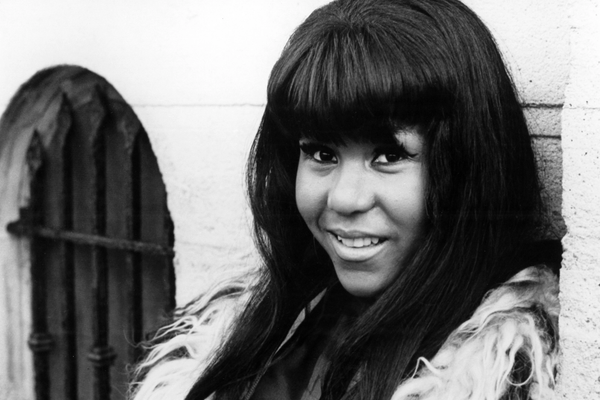Clydie King was born in August 1943 and was only two years old when her mother died, after which she was raised by her older sister, Lula Mae Crittendon. King sang in her church choir, and she stood out at an early age. At age eight, she appeared on a national television show hosted by the-then popular TV and Radio personality Art Linkletter. Not long after, her family moved to Los Angeles, where she started her recording career at thirteen, fronting a doo-wop group called Little Clydie and The Teens. Over the succeeding years she recorded frequently as a leader, mostly in a classic doo-wop or soul style, for the Specialty, Philips, Minit and Imperial labels. Her reputation as a fine vocalist led to sessions for Phil Spector, and a three-year stint (alongside the similarly-gifted vocalist Merry Clayton) as one of The Raelettes, Ray Charles’ vocal backup.
Her upbringing in the Church and her gift for Gospel phrasing, and the emotive power that came with it, meant that when Rock and Roll started to be receptive to the sound of church in the late sixties, she became even more sought after, starring in the epochal Mad Dogs and Englishmen US tour fronted by Joe Cocker in early 1970. Cocker’s friend and band mate Leon Russell had been part of Phil Spector’s musical crew, and no doubt knew Clydie from those days. She then landed a solo deal with the Lizard records label.
Lizard was a short-lived imprint founded by producer Gabriel Mekler, based in Hollywood and active between 1969 through to 1971. Born in Palestine, Mekler was a classically trained pianist. Upon arriving in LA, in the sixties, Mekler sought out Dunhill Records, and was hired as a staff producer where he made music history with Steppenwolf’s self-titled debut album in 1968 followed by recordings with Three Dog Night, such as ‘One’, ‘Try A Little Tenderness’, ‘Eli’s Coming’ and ‘Celebrate’. They would become one of the most successful bands of the early seventies, especially in the USA. With this considerable track record of success behind him, Mekler’s venture into record company ownership seemed to augur well.
The album Direct Me was King’s debut album and Mekler put together a fine studio crew to back her. Keyboard ace Billy Preston was of course a seasoned and well-established musician, having played on The Beatles’ Let It Be album sessions and had cut two albums of his own for The Beatles label, as well as having a sizeable hit record with the Gospel-soaked ‘That’s The Way God Planned It’. He would also be a part of the broader Rolling Stones recording and gigging entourage throughout the early seventies up until and including the Love You Live album in 1977.
Drummer Paul Humphrey fronted his own band, Paul Humphrey & His Cool Aid Chemists, who were also signed to Lizard. Humphrey also drummed on the Marvin Gaye classic, Let’s Get It On, and had a career that included recordings by Steely Dan, Frank Zappa, Dusty Springfield, Maria Muldaur, Albert King and many others. Bassist Bob West co-wrote the lovely ‘I’ll Be There’, a Global smash hit for The Jackson 5, and had also featured on many Los Angeles recordings featuring the famous ‘Wrecking Crew’ of musicians – including Leon Russell, of course. Backing vocals were provided by The Blackberries – which included Clydie King, Merry Clayton and Venetta Fields.
Guitarist David T Walker is a gifted player who has released many solo albums, as well as playing on sets by Joe Sample, The Love Unlimited Orchestra, and scores more. Percussionist Sandra Crouch played on recordings by Neil Diamond, Merry Clayton, Edwin Starr, and many Gospel albums, and is the sister of the famous Gospel band leader Andraé Crouch.
Even the engineers on the album were top notch – including Dave Hassinger, who worked with The Electric Prunes, and The Rolling Stones on their 1966 album Aftermath, and Johnny Golden, a great cutting engineer and record producer who had worked on countless albums. The reverse of the album sleeve featured notes by Preston and Quincy Jones, who praises King’s voice as “warm and soulful with a lyrical quality that’s hard to find.”
Although it was a modest success, Clydie King would soon throw her weight behind a vocal combo called Brown Sugar, although she did sing on The Rolling Stones epochal Exile On Main Street album in 1972. Somewhat surprisingly, alongside Merry Clayton, King sang backing vocals on the song ‘Sweet Home Alabama’ by Lynyrd Skynyrd, released in 1973, a song whose assertion of Southern values (a riposte to Neil Young’s anti-redneck ‘Southern Man’) was not without controversy, and didn’t sit well with King and Clayton.
King came into the orbit of Bob Dylan in 1980, during his ‘Born Again’ religious phase. It is said that she and Dylan were not only secretly married, but that she also bore him two children, and that he bought her a house. They clearly shared a great love of music. According to Dylan, Clydie was the ultimate singing partner that nobody else ever came close to: “We were soul mates”.
Direct Me was to be King’s only solo outing but is a fine showcase for her vocal talent. She passed away in January 2019, aged seventy-five. Would that she had recorded more solo projects.
With thanks to Alan Robinson
